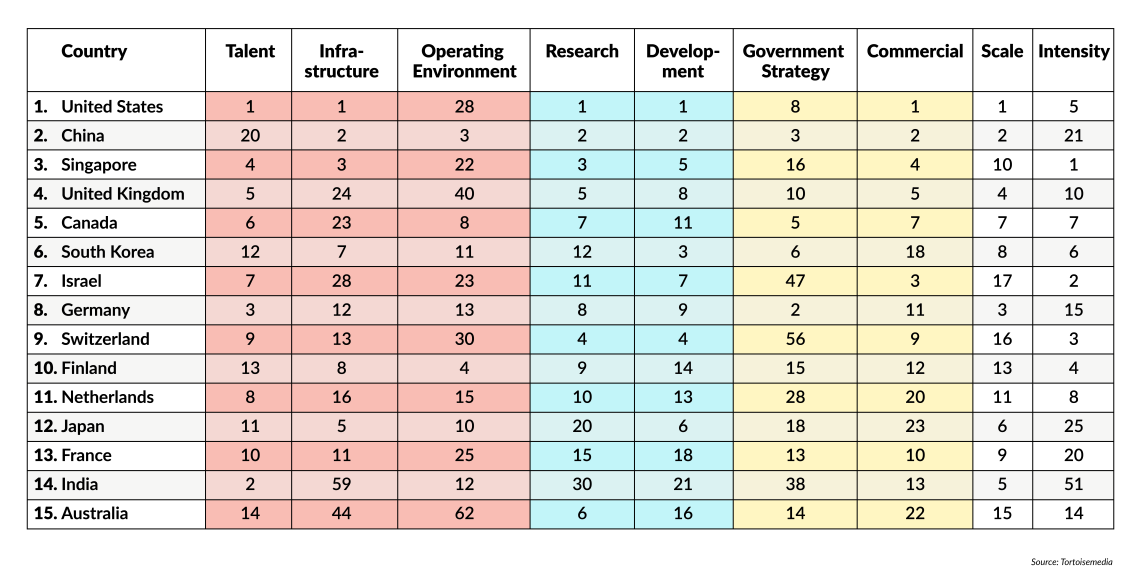Can China collaborate with the West on AI?
Despite growing Western mistrust of Beijing after high-profile cases of espionage, some limited collaboration in advancing AI safety is likely.

In a nutshell
- There is growing momentum to tackle AI safety in global fora
- The U.S. and China are close rivals in the technology race
- They will likely collaborate in some areas despite tensions
In November, British Prime Minister Rishi Sunak held the first global conference devoted to the risks associated with artificial intelligence (AI). Representatives from over 30 countries were present. Chinese Deputy Minister of Science and Technology Wu Zhaohui also attended, albeit only on the first day. All the participants at the summit signed a declaration expressing the desire to cooperate on the safety of AI – a considerable achievement given the current tensions between China and the West.
China’s rapid AI development
Many criticized the United Kingdom for inviting China to participate in the summit. Prime Minister Sunak retorted that, without the participation of the world’s leading AI countries, it would be impossible to have a substantive dialogue on the subject.
Indeed, China is already ahead of the United States in many aspects of the AI race. The AI Index report released by Stanford University shows that China already has the world’s top AI experts, with China accounting for nine of the world’s top 10 organizations in terms of total number of published papers. Companies such as Tencent, Alibaba and Huawei rank among the world’s top 10 companies in AI research. At the infrastructure level, China has built the world’s largest fiber-optic and mobile broadband network and the world’s largest 5G independent network.
Chinese Communist Party (CCP) leadership is implementing a nationwide mobilization system, and its 13th and 14th Five-Year Plans have set specific AI goals with a particular focus on the supply chain. At present, China is already working to establish a standard system for artificial intelligence.
Facts & figures
Country rankings in the 2023 Global Artificial Intelligence index

AI as a global threat
Over the past few years, figures such as Elon Musk and Bill Gates have warned about the potentially dangerous consequences of cutting-edge AI. The rise of AI certainly enables the potential for crime on a global scale. Sophisticated machine learning tools enable the creation of fake images, videos, audio or text. This may lead to the widespread distribution of false information online, which can compromise the reliability of information and shake people’s trust in news sources. If terrorists gain the ability to utilize AI for harmful purposes, it could put a nation or even the entire world at great risk.
In a military context, deep fakes might one day cause national security leaders to make critical decisions based on false information, potentially triggering a major crisis or war. In such scenarios, the AI-driven automated activation of missile defense systems without human oversight could inadvertently lead to escalation, possibly even nuclear conflict.
From a business standpoint, exploiting weaknesses in AI systems could allow easy execution of cyberattacks, leading to the destruction of vital infrastructure and theft of sensitive information. Moreover, due to technological challenges and the dominance of large corporations, AI might result in market monopolization and unfair competition, undermining market fairness.
Considering the potential of AI as an existential threat in the future, the creation of an international AI regulatory body appears to be essential. This is one of the key reasons behind China’s decision to join and endorse the summit declaration. Prime Minister Sunak has proposed forming an international expert committee, similar to the Intergovernmental Panel on Climate Change (IPCC).
Recently, the U.S. government and the Group of Seven (G7) issued efforts to regulate artificial intelligence in the form of a White House executive order and a voluntary code of conduct, respectively. The European Union is expected to finalize its Artificial Intelligence Bill in December, and the United Nations’ newly formed AI Advisory Board will make its own recommendations by the end of 2023. On July 13 of the same year, China’s Central Office of Internet Information Technology also released Interim Measures for the Administration of Generative Artificial Intelligence – Beijing’s first regulatory measures on AI.
Values and incentives in the AI race
Despite Prime Minister Sunak’s optimism at the summit, it is widely acknowledged that much AI cooperation hinges on political trust. The U.S. has explicitly prohibited the export of military-related AI chips to China. Washington is concerned that Beijing’s use of advanced AI in its military could not only surpass American military capabilities but also enable China to take control of Taiwan and the South China Sea. For Chinese President Xi Jinping, these objectives align with his “Chinese Dream” vision of global influence. While Western countries’ stance toward Beijing varies, they share a deep caution toward its AI progress, largely because their value systems differ significantly from China’s. As a result, most of the West will likely align with the U.S. in its approach to AI development and regulation.
Concurrently, a major concern for Western democracies is that China’s authoritarian regime will use AI advancements to intensify control over its citizens. A prime example is Zhipu ChatGLM, a Chinese version of ChatGPT. Similar to Chinese internet surveillance, the platform restricts access to information on society, history and politics in line with prevailing ideologies. Moreover, the export of China’s AI products could also negatively affect democracy in other nations.
More on technology
The promise and peril of Worldcoin
Tectonic shifts in AI-powered banking
China’s eagerness to research and set standards with other countries is partly the result of the Biden administration’s recent tightening of AI chip exports to China in October. The U.S. justified this action by stating that “advanced semiconductors … could fuel breakthroughs in artificial intelligence and sophisticated computers that are critical to [Chinese] military applications.” China risks falling behind in the global race for memory chips and AI development if it does not take measures to address the sanctions. As this gap widens, it may impede China’s progress in building large-scale AI models for some time.
However, the U.S. stance is likely to spur China to intensify its efforts in developing alternative technologies. Beijing may also seek to acquire foreign chips through other means, like the black market, or, using atypical procurement, circumvent the ban by having foreign chip manufacturers produce alternative chips in China or in territories where the U.S. measures are not enforced. The prospect of collaborating with Western countries other than the U.S. in AI, potentially bypassing American restrictions, adds to China’s motivation for cooperation.
Western countries, having learned from past experiences with technology transfer issues involving China, are cautious. Europe once eagerly invited China to join projects like the Galileo satellite navigation system and nuclear fission initiatives, only to later have to ask the Chinese delegation to leave.
Scenarios
Selective collaboration
When U.S. Commerce Secretary Gina Raimondo said that “we are working to expand information-sharing, research collaboration and ultimately policy alignment across the globe on advanced AI,” it is likely that she meant working with Western allies. The announcement by the United Kingdom and the U.S. to jointly establish an AI security institute exemplifies this focus. Special measures will likely be required for sharing information, research and cooperation with China. However, it will be an extremely difficult task for the U.S. government to determine the scale of cooperation and information sharing. Nonetheless, the fact that Mr. Zhaohui was seated next to Secretary Raimondo at the meeting and signed the summit’s declaration is not insignificant. Cooperation will take place, but it is unlikely to be entirely open or unrestricted.
In the coming years, Western countries and China will engage in selective collaboration, searching for common ground while steering clear of sensitive topics. This approach, over time, may help to gradually rebuild a minimum level of political trust.
Emergence of two AI standards
However, due to differing visions of the global order and China’s close alignment with other authoritarian states, under President Xi, international cooperation faces significant challenges. This divergence is likely to result in two distinct AI standards and markets. China’s development of home-grown AI chips and content-related AI standards may set the stage for a unique Chinese AI framework. Navigating between differing global AI standards and practices could potentially complicate the modernization and democratization processes for countries that are late adopters of the technology.
For industry-specific scenarios and bespoke geopolitical intelligence, contact us and we will provide you with more information about our advisory services.








